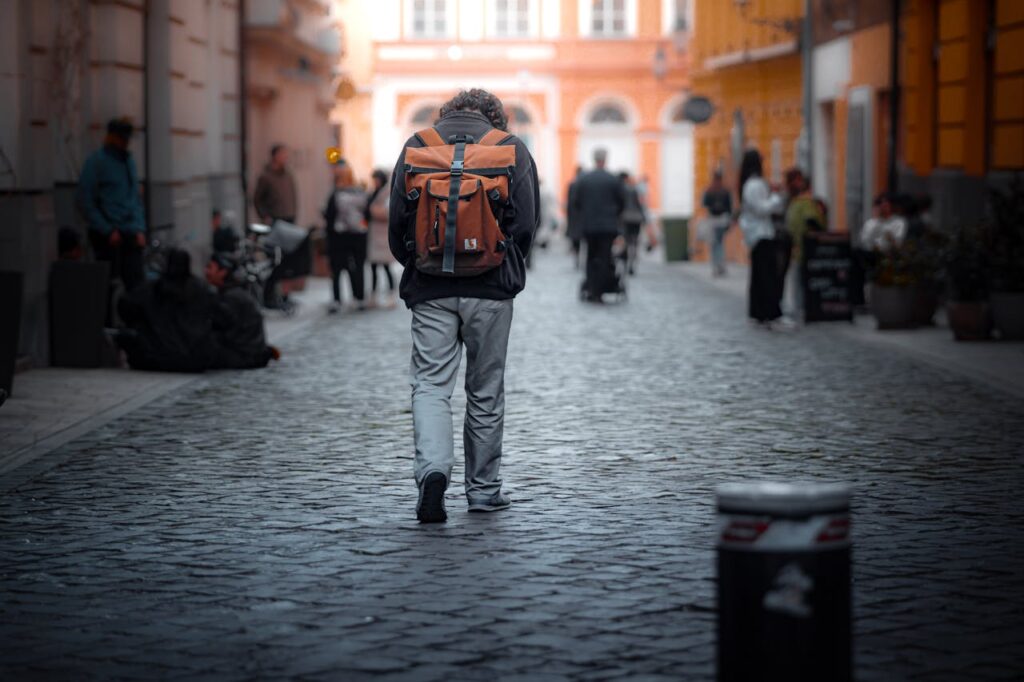We may earn money or products from the companies mentioned in this post. This means if you click on the link and purchase the item, I will receive a small commission at no extra cost to you ... you're just helping re-supply our family's travel fund.

To travel is to be a guest in someone else’s home. We arrive with wide-eyed wonder, eager to connect with a new culture and create lasting memories. But sometimes, in our excitement, we can forget that the charming cobblestone street we’re admiring is the same one a local needs to navigate on their way to work. The beautiful places we visit are real, living communities. By being mindful of a few common behaviors, we can move beyond being just another tourist and become the kind of thoughtful, respectful guest that locals are genuinely happy to welcome.
1. Blocking Sidewalks and Entrances

In the awe of a new city, it is incredibly easy to stop dead in your tracks to take a photo or consult a map. But for a local trying to get to their appointment or simply make it home, a human barricade on a narrow sidewalk is a daily frustration. Be aware of the flow of foot traffic around you. Step to the side, against a wall, or into a small alcove to get your bearings. This single act of spatial awareness makes you an infinitely more courteous guest.
2. Being Loud in Quiet, Residential Areas

The quiet, picturesque alleyway you are exploring might be your vacation discovery, but it is also someone’s neighborhood. Sounds carry, especially in old cities with narrow streets and stone walls. Your enthusiastic conversation or late-night laughter can echo directly into the windows of people who are living, sleeping, and raising families. Modulate your voice as you would in your own neighborhood after 10 p.m. and treat their home with that same respect.
3. Haggling Aggressively Over Small Amounts

Bargaining is a vibrant part of the culture in many markets around the world. A bit of friendly back-and-forth is often expected and can be a fun part of the interaction. However, there is a fine line between negotiation and disrespect. Arguing intensely to save the equivalent of a dollar can feel deeply insulting to an artisan who has spent hours on their craft. Know when a price is fair and accept it. That small amount likely means much more to them than it does to you.
4. Making Assumptions About Culture or Language

Assuming that everyone in a country speaks English or conforms to a stereotype you’ve seen in a movie comes across as lazy and dismissive. Learning even a few basic phrases in the local language, like “hello,” “please,” “excuse me,” and “thank you,” is a powerful gesture of respect. It shows that you recognize you are a visitor in their culture and that you have made an effort to connect on their terms, no matter how small or imperfect your pronunciation.
5. Not Following Local Dress Codes

What you wear on a beach in Miami is likely not appropriate for visiting a sacred temple in Bangkok or a historic church in Rome. Many religious sites around the world require shoulders and knees to be covered as a sign of respect for their sacred space. Ignoring these customs is seen as deeply disrespectful. Do a little research on your destination before you go, and always carry a lightweight scarf or shawl in your bag for these situations.
6. Complaining That Things Aren’t Like They Are “Back Home”

The entire point of travel is to experience something different. Voicing complaints that a shop closes for a siesta, that the coffee is served differently, or that the pace of life is slower is missing the point. You traveled to immerse yourself in a new culture, not to find a perfect replica of your own. Embrace the differences with curiosity and an open mind. These unique rhythms and customs are the very things that make a place special.
7. Taking Photos of People Without Asking

A local person in traditional dress or a child playing in a fountain can make for a beautiful photograph, but they are not props for your vacation album. They are human beings going about their lives. Taking someone’s picture without their permission, especially a close-up, is intrusive and objectifying. Always ask politely first; often a simple smile and a gesture toward your camera is enough. If they decline or wave you off, respect their wishes graciously and move on.
8. Treating Restaurants Like Your Personal Office or Lounge

In many cultures, particularly in fast-paced urban centers, a restaurant table is valuable real estate, and the staff relies on turning tables to make a living. Lingering for hours over a single cup of coffee while you use the free Wi-Fi can be a major source of frustration for the establishment, especially during busy meal times. Be mindful of how long you stay. If you do need to work for a while, be courteous and order another drink or a snack to show your appreciation.
9. Disrespecting Rules Around Sacred or Historic Sites

Those velvet ropes and “Do Not Touch” signs are not suggestions; they are critical measures to protect our shared heritage. Sitting on ancient ruins, touching fragile artifacts, or, worst of all, carving your initials into a historic wall causes irreparable damage. These sites have survived for centuries or even millennia. Your desire for a unique photo or a moment of defiance can permanently scar a piece of human history.
10. Expecting Immediate Service and Constant Efficiency

The pace of life varies dramatically around the world. In many places, a meal is meant to be a long, relaxed affair to be savored with company, not a race against the clock. A more laid-back attitude toward time is not a sign of bad service; it is a different cultural value. Showing impatience and frustration with a slower pace can come across as entitled and rude. Take a deep breath, adjust your expectations, and enjoy the opportunity to slow down.
11. Ignoring Local Transportation Etiquette

Every city has its own unwritten rules for public transit. This could mean waiting for people to exit the train before you board, giving up your seat to an elderly person or a pregnant woman without being asked, or keeping your voice down and not eating on the train. The best way to learn is to observe how locals behave and follow their lead. Efficient and pleasant public transportation relies on everyone following a shared code of social conduct.
12. Leaving a Mess Behind in Public Spaces

Whether it’s a picnic in a park, a day at the beach, or a snack on a city bench, always leave a place cleaner than you found it. Leaving behind your trash, cigarette butts, or food wrappers is a clear sign of disrespect for the local environment and for the people who work to keep it beautiful. Carry a small bag with you for your trash until you can find a proper bin. It is one of the most fundamental principles of being a good guest, anywhere in the world.
13. Overpacking and Blocking Shared Space

Dragging an oversized suitcase onto a crowded subway or wedging backpacks into narrow café aisles makes daily life harder for the people who actually live there. Pack lighter and keep your bags close to your body, especially on public transport or in small restaurants. If you must bring larger luggage, plan ahead for taxis or dedicated storage so you’re not turning a local’s commute or lunch break into an obstacle course.